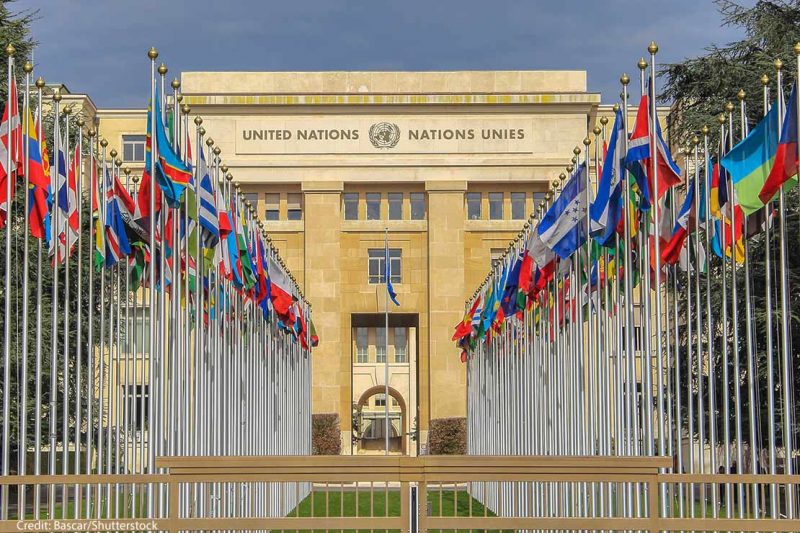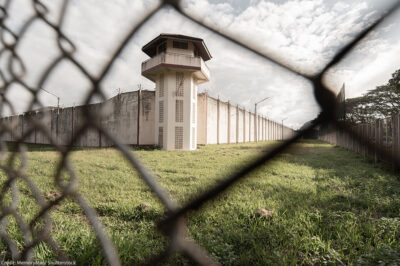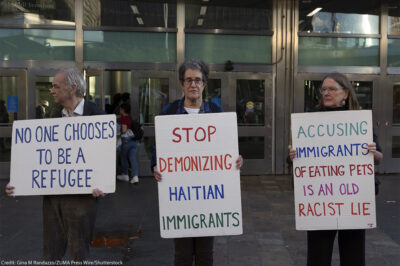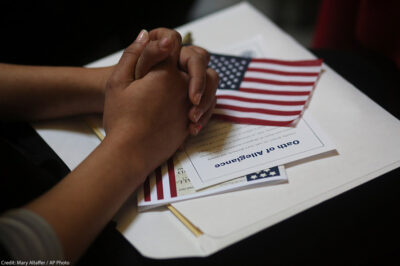International Accountability is Critical to Dismantling Systemic Racism and Police Brutality Domestically


This month marks a year since George Floyd’s murder at the hands of police, which outraged the world and sparked unprecedented domestic and global protests calling for racial justice and transformative change. Minneapolis police officer Derek Chauvin’s guilty verdict should have been an inevitable accountability measure, yet even though the horrible display of brutality was caught on camera in broad daylight, the outcome was far from guaranteed. The uncertainty leading up to the verdict illustrates the normalization of impunity for police in the criminal legal system.
Calls for accountability following Floyd’s murder reverberated around the world, and ultimately led to the unprecedented demand for a United Nations commission of inquiry to investigate racist police violence in the U.S. We now hold the same expectations for international human rights bodies to respond and utilize the momentum of this moment for transformative change.
Today, 171 family members of victims of police violence, with the support of a large coalition of advocacy groups from more than 40 countries all over the world, sent a letter to the U.N. High Commissioner for Human Rights and another letter to the Foreign Ministers of African States demanding effective accountability and follow-up to HRC resolution 43/1. The letters reiterated the call to mandate an international independent investigation into police killings and violent law enforcement responses to protests in the U.S., and create a mechanism imbued with the power to investigate systemic racism in law enforcement on a global scale.
Resolution 43/1, established by the United Nations Human Rights Council (UNHRC) in June 2020, vowed to promote and protect “the human rights and fundamental freedoms of Africans and of people of African descent against excessive use of force and other human rights violations by law enforcement officers.” Although the resolution was a step in the right direction and ultimately mandated a global report by the U.N. High Commissioner on systemic racism and police brutality, the original ask and the draft resolution which was proposed by 54 African nations for a U.S.-focused commission of inquiry was ultimately watered down to this resolution due to immense diplomatic pressure from the Trump administration.
The letters also call on the UNHRC to reinforce to U.N. member states that the transatlantic slave trade and colonialism were grave violations of international law, and that the legacies of this violence still impact the world today. The institution of policing in the U.S. specifically has strong roots in the legacies of slavery, imperialism, and white supremacy, and directly evolved from slave patrols.
The work of Mothers Against Police Brutality has directly impacted the way that the High Commissioner for Human Rights and the UNHRC have approached these systemic issues, and will no doubt have a direct impact on the High Commissioner’s report, which is expected next month. This expansion of domestic advocacy into the international sphere allows us to sustain the momentum of this moment and ensure that the U.N. and other international bodies keep this issue at the forefront of their work. The international community must hold the U.S. government accountable for grave violations of human rights, especially against Black, Indigenous, and Brown communities.
Seeking international accountability has a longstanding tradition with Black advocates and organizations in the U.S., notably the 1947 Appeal to the World petition by W.E.B. Du Bois and the NAACP. Historically, international pressure has frequently contributed to domestic victories on racial justice issues, and has long been documented by historians of the Cold War and Civil Rights Movement.
Today’s letters note that impunity for police killings in the U.S., especially those of people of African descent, continues unabated and needs to be addressed with swift, concrete action on the domestic as well as international level. While the Biden administration has signaled its intent to address systemic racism and police violence, a robust international accountability mechanism would further support and complement, not undermine, domestic efforts to dismantle systemic racism in the U.S.
Addressing the lack of accountability for police violence has long challenged even our best-positioned leaders, due to a complex web of state and local laws and policies, long-standing legal obstacles such as the doctrine of qualified immunity, the pervasiveness of white supremacist ideologies, and the decentralized nature of police institutions — there are more than 18,000 law enforcement agencies throughout the country that are not directly accountable to the federal executive branch.
The ACLU will continue its work with civil society organizations, including groups representing family members of victims of police violence across the country and globally. In collaboration with these groups, we aim to highlight the importance of addressing the root causes of racist police violence in the U.S., its disproportionate impact on Black, Brown, and Indigenous communities, and how the violence that occurs here can and does have an impact on people around the world.
The international community must hold the U.S. government accountable for the systemic racism and violence that is perpetuated through policing. And the U.S. needs to take radical measures to address and repair these harms and to stop the escalation of police violence so that impacted communities across the country can truly begin healing, grieving, and building support networks that prioritize the protection of human dignity and community care. Passing H.R. 40, which would establish a commission to study the legacy of slavery and make recommendations to Congress for reparations, is a critical step toward healing and justice. And to truly mitigate the harm of police violence, we must divest from policing and reinvest those resources into life-affirming alternatives to law enforcement that uplift communities.
As domestic and international organizations reflect one year after the murder of George Floyd, we must remember that even as his death sparked a movement, his killing wasn’t the first or last at the hands of U.S. police in the past year. In 2021 alone, there have already been more than 300 police killings. Just weeks ago, Daunte Wright was killed by police a few miles away from the site of Floyd’s murder, and as far away as Hawai’i, Lindani Myeni, a former South African rugby player, was shot and killed by the police.
Though we hope the guilty verdict in the Chauvin trial will help a grieving community begin to heal, this outcome is an exception and not the rule. Between 2013 and 2020, 98.3 percent of police officers who killed someone were not charged with a crime. Of the small percentage who were charged, only 25 percent were actually convicted. While convictions can be a step toward accountability and healing, it is important to note that they are not synonymous with justice.
The end result of the Chauvin trial would not have been possible without the efforts of community organizers, protesters, and advocates for the victims of police violence who tirelessly demanded accountability. Now, elected officials must follow their lead and sustain the momentum sparked last summer.
If the Biden administration is serious about addressing police violence and its pledge to lead by the power of example, it should welcome international scrutiny into the nation’s domestic human rights record. The U.S. should listen to the pleas of George Floyd’s family and hundreds of other family members of victims of police violence. The administration must heed their call to establish a commission of inquiry to hold the U.S. accountable for the rampant systemic racism that perpetuates law enforcement violence. Without centering universal human rights, engaging in historic truth telling, and seeking full accountability and reparations, there will never be national healing, peace, and reconciliation.




